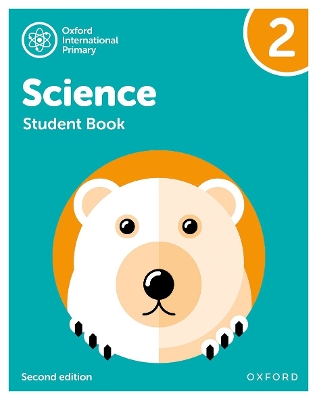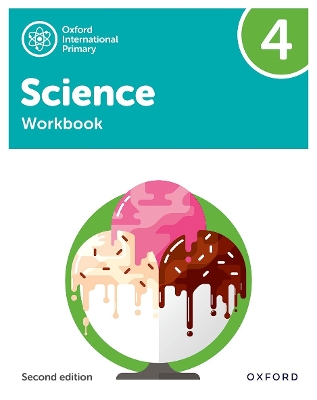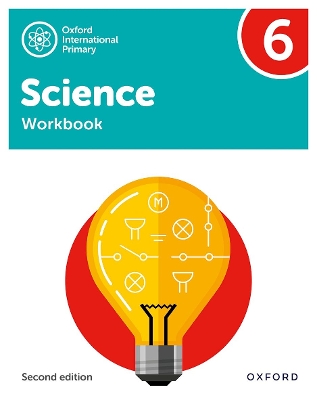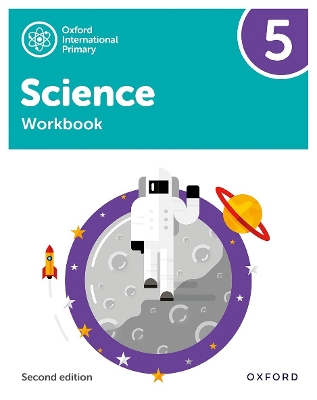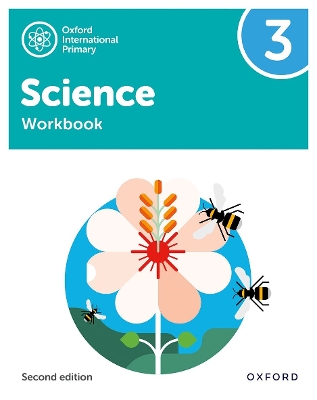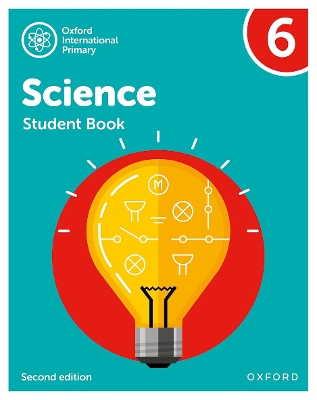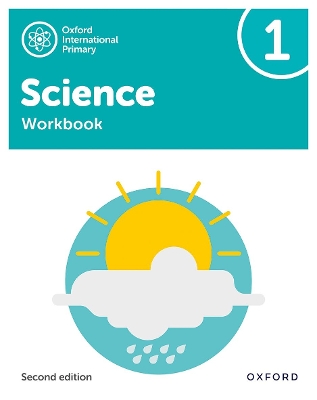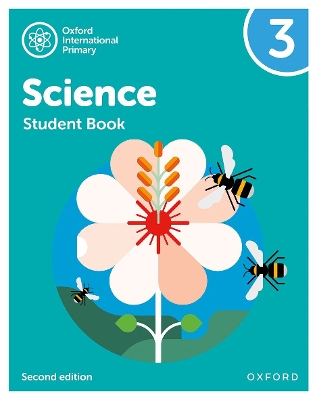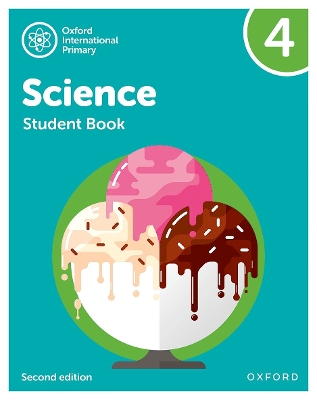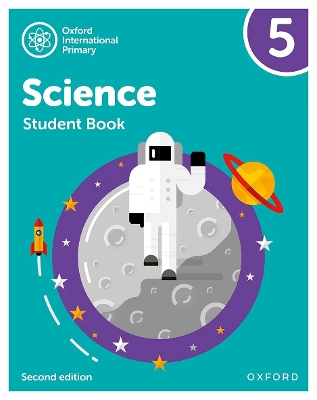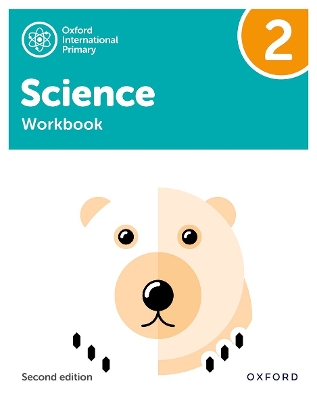Oxford International Primary Science Second Edition
11 total works
Oxford International Science: Student Book 2
by Deborah Roberts, Terry Hudson, Alan Haigh, and Geraldine Shaw
· Students learn to think creatively through answering questions about the world around them
· Engaging topics have been selected to develop a sense of value and responsibility to living things and the planet
· Students learn the language of scientific enquiry, for example the meaning of observe and predict mean in a scientific context, as well as the important key words for talking about a topic
· The language is clear and easy with photos, illustrations and diagrams to help EAL students develop fluency in scientific language
· The topics are explored in careful stages, introducing different aspects at a pace that allows students to absorb and practise what they have learned
· Students learn to think creatively through answering questions about the world around them
· Engaging topics have been selected to develop a sense of value and responsibility to living things and the planet
· Students learn the language of scientific enquiry, for example the meaning of observeand predictin a scientific context, as well as the important key words for talking about a topic
· The language is clear and easy with photos, illustrations and diagrams to help EAL students develop fluency in scientific language
· Each page of the Workbook is linked to the Students Books, providing additional differentiated tasks and activities perfect for use in the classroom or at home
· Workbooks include additional practice materials for classroom or home study; explanations of key concepts; self-assessment activities to reflect on learning
· Students learn to think creatively through answering questions about the world around them.
· Engaging topics have been selected to develop a sense of value and responsibility to living things and the planet.
· Students learn the language of scientific enquiry, for example the meaning of observeand predictin a scientific context, as well as the important key words for talking about a topic.
· The language is clear and easy with photos, illustrations and diagrams to help EAL students develop fluency in scientific language
· Each page of the Workbook is linked to the Students Books, providing additional differentiated tasks and activities perfect for use in the classroom or at home
· Workbooks include additional practice materials for classroom or home study; explanations of key concepts; self-assessment activities to reflect on learning
· Students learn to think creatively through answering questions about the world around them
· Engaging topics have been selected to develop a sense of value and responsibility to living things and the planet
· Students learn the language of scientific enquiry, for example the meaning of observeand predictin a scientific context, as well as the important key words for talking about a topic
· The language is clear and easy with photos, illustrations and diagrams to help EAL students develop fluency in scientific language
· Each page of the Workbook is linked to the Students Books, providing additional differentiated tasks and activities perfect for use in the classroom or at home
· Workbooks include additional practice materials for classroom or home study; explanations of key concepts; self-assessment activities to reflect on learning
· Students learn to think creatively through answering questions about the world around them
· Engaging topics have been selected to develop a sense of value and responsibility to living things and the planet.
· Students learn the language of scientific enquiry, for example the meaning of observeand predictin a scientific context, as well as the important key words for talking about a topic
· The language is clear and easy with photos, illustrations and diagrams to help EAL students develop fluency in scientific language
· Each page of the Workbook is linked to the Students Books, providing additional differentiated tasks and activities perfect for use in the classroom or at home
· Workbooks include additional practice materials for classroom or home study; explanations of key concepts; self-assessment activities to reflect on learning
Oxford International Science: Student Book 6
by Deborah Roberts, Terry Hudson, Alan Haigh, and Geraldine Shaw
· Students learn to think creatively through answering questions about the world around them
· Engaging topics have been selected to develop a sense of value and responsibility to living things and the planet
· Students learn the language of scientific enquiry, for example the meaning of observe and predict mean in a scientific context, as well as the important key words for talking about a topic
· The language is clear and easy with photos, illustrations and diagrams to help EAL students develop fluency in scientific language
· The topics are explored in careful stages, introducing different aspects at a pace that allows students to absorb and practise what they have learned
· Students learn to think creatively through answering questions about the world around them.
· Engaging topics have been selected to develop a sense of value and responsibility to living things and the planet.
· Students learn the language of scientific enquiry, for example the meaning of observeand predictin a scientific context, as well as the important key words for talking about a topic.
· The language is clear and easy with photos, illustrations and diagrams to help EAL students develop fluency in scientific language
· Each page of the Workbook is linked to the Students Books, providing additional differentiated tasks and activities perfect for use in the classroom or at home
· Workbooks include additional practice materials for classroom or home study; explanations of key concepts; self-assessment activities to reflect on learning
Oxford International Science: Student Book 3
by Deborah Roberts, Terry Hudson, Alan Haigh, and Geraldine Shaw
· Students learn to think creatively through answering questions about the world around them
· Engaging topics have been selected to develop a sense of value and responsibility to living things and the planet
· Students learn the language of scientific enquiry, for example the meaning of observe and predict mean in a scientific context, as well as the important key words for talking about a topic
· The language is clear and easy with photos, illustrations and diagrams to help EAL students develop fluency in scientific language
· The topics are explored in careful stages, introducing different aspects at a pace that allows students to absorb and practise what they have learned
Oxford International Science: Student Book 4
by Deborah Roberts, Terry Hudson, Alan Haigh, and Geraldine Shaw
· Students learn to think creatively through answering questions about the world around them
· Engaging topics have been selected to develop a sense of value and responsibility to living things and the planet
· Students learn the language of scientific enquiry, for example the meaning of observe and predict mean in a scientific context, as well as the important key words for talking about a topic
· The language is clear and easy with photos, illustrations and diagrams to help EAL students develop fluency in scientific language
· The topics are explored in careful stages, introducing different aspects at a pace that allows students to absorb and practise what they have learned
Oxford International Science: Student Book 5
by Deborah Roberts, Terry Hudson, Alan Haigh, and Geraldine Shaw
· Students learn to think creatively through answering questions about the world around them
· Engaging topics have been selected to develop a sense of value and responsibility to living things and the planet
· Students learn the language of scientific enquiry, for example the meaning of observe and predict mean in a scientific context, as well as the important key words for talking about a topic
· The language is clear and easy with photos, illustrations and diagrams to help EAL students develop fluency in scientific language
· The topics are explored in careful stages, introducing different aspects at a pace that allows students to absorb and practise what they have learned
· Students learn to think creatively through answering questions about the world around them
· Engaging topics have been selected to develop a sense of value and responsibility to living things and the planet.
· Students learn the language of scientific enquiry, for example the meaning of observeand predictin a scientific context, as well as the important key words for talking about a topic
· The language is clear and easy with photos, illustrations and diagrams to help EAL students develop fluency in scientific language
· Each page of the Workbook is linked to the Students Books, providing additional differentiated tasks and activities perfect for use in the classroom or at home
· Workbooks include additional practice materials for classroom or home study; explanations of key concepts; self-assessment activities to reflect on learning
